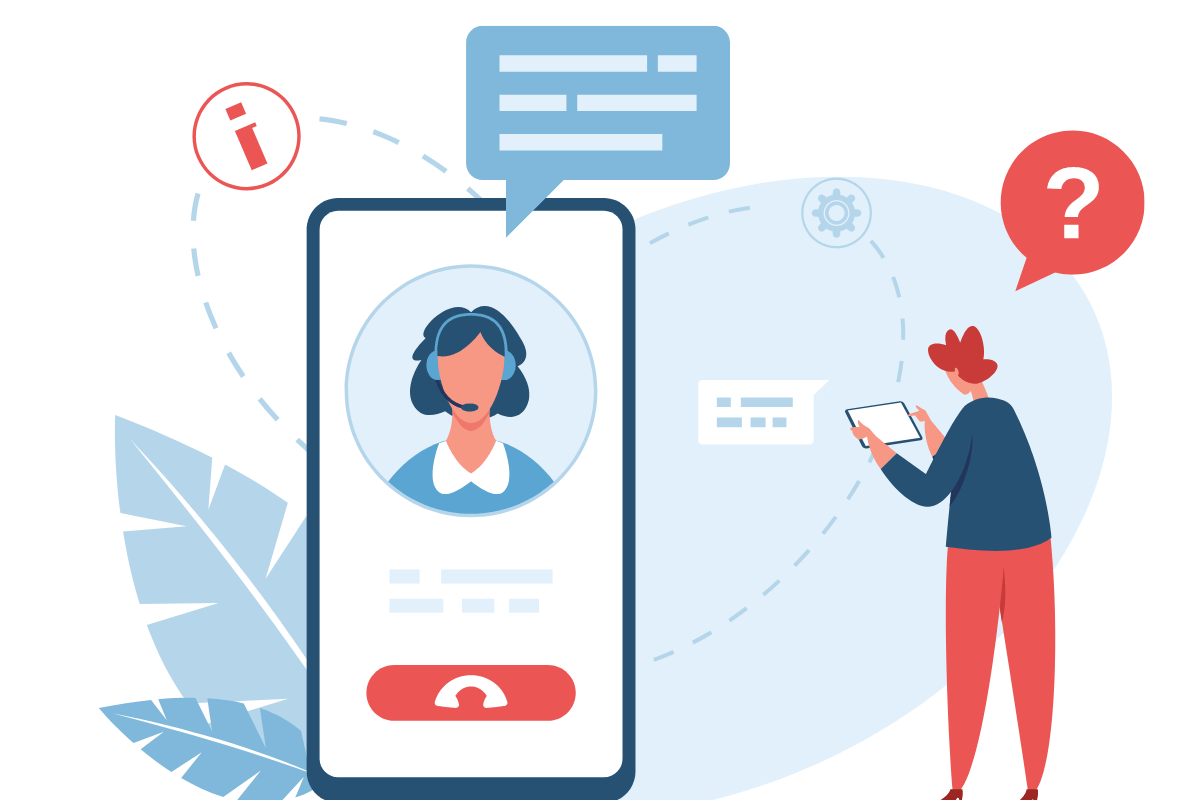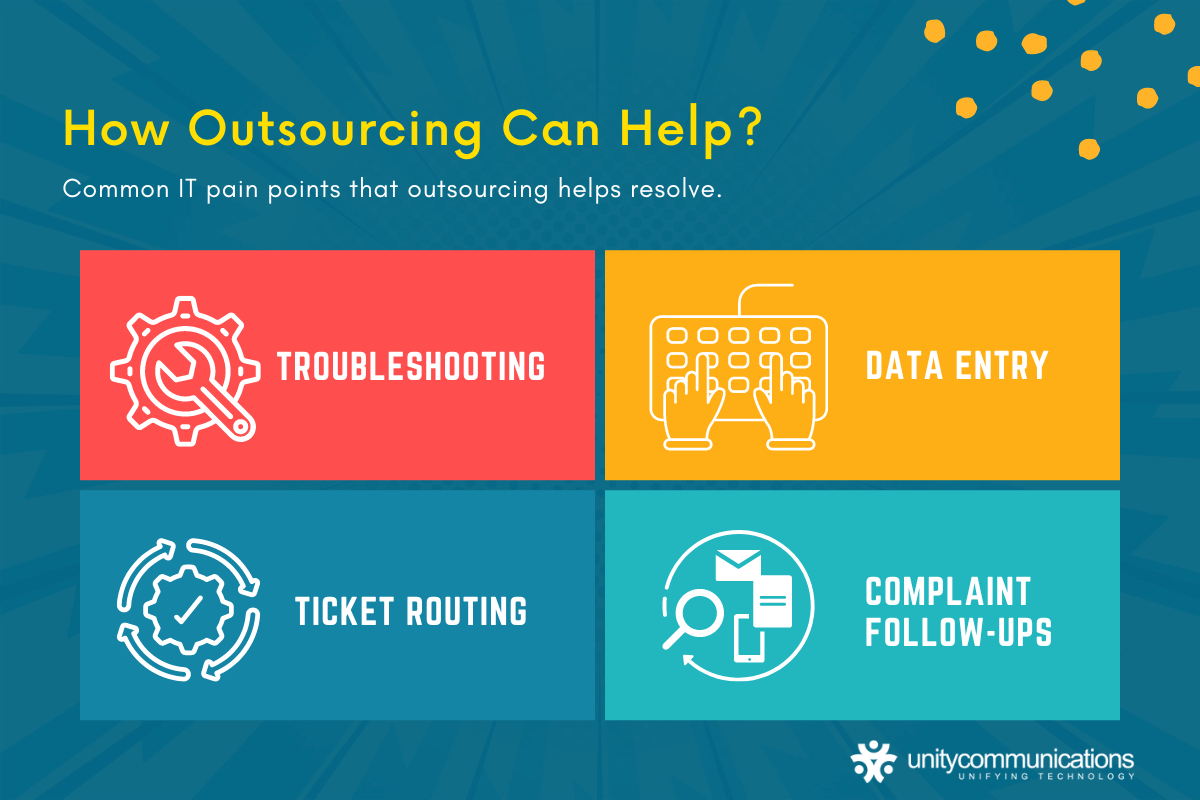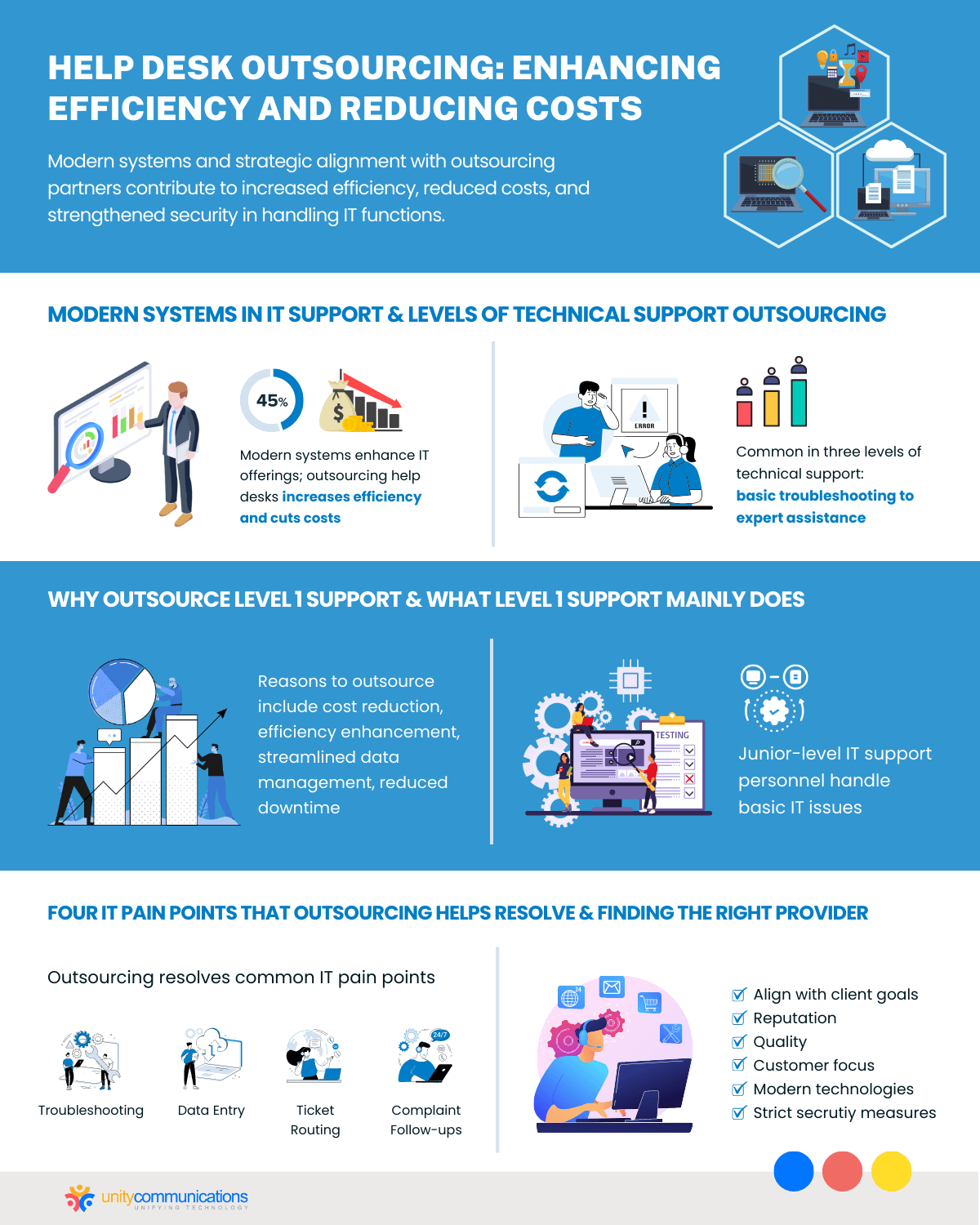IN THIS ARTICLE
Table of Contents
Modern systems help information technology (IT) companies enhance their offerings to customers and clients. They can also meet those growing customer demands while streamlining workloads. However, IT firms may struggle to address technical issues while simultaneously focusing on customer needs.
Outsourcing a help desk is the best option to ease response to IT inquiries. Companies benefit from increased efficiency and reduced costs while quickly satisfying customer needs.
Although help desks vary by tier, organizations commonly outsource level 1 support. Dive deeper into this article to find out why. You’ll also know how to resolve IT pain points with the right outsourcing partner.
The Most Commonly Outsourced Technical Support

Technical support outsourcing means hiring a third-party service provider to handle your help desk. IT companies often divide their outsourced technical support into three categories.
- Level 1. Basic IT and troubleshooting support for known technical challenges. It covers usage problems, network issues, and computer diagnoses.
- Level 2. In-depth technical assistance using more advanced solutions. It addresses user problems that a level 1 agent cannot handle.
- Level 3. Expert product and service help desks involving engineers and specialists. They resolve the most complex technical issues.
What Level 1 Technical Support Mainly Does
Of all the tiers, companies usually outsource level 1 support. This type of back-office outsourcing involves junior-level IT support personnel.
Tier 1 technicians have the least experience. They must adhere to standard operating procedures (SOPs) to solve common user problems such as hardware and software verifications, installation and setup difficulties, and username and password issues.
They perform basic technical support services such as:
- Explaining product information and user manual
- Answering customer inquiries via phone calls, email, or live chat
- Collecting and compiling consumer data
- Conducting data entry to process requests
- Executing basic troubleshooting using scripts and questionnaires
- Understanding the level of needed technical assistance through a standardized system
- Creating tickets for level 2 technical support
In short, the level 1 help desk team serves as the main line of defense when dealing with technical problems. Typically, junior technicians solve day-to-day issues to simplify risk control and organize technical work. They also help prevent duplicate tasks from reaching IT specialists’ desks, streamlining support and improving productivity.
But what if level 1 technical support agents can’t find solutions from a set of primary IT instructions? In that case, they forward the queries to upper-level technicians for more detailed problem-solving measures.
To understand why companies prefer to delegate level 1 help desks to a third-party service provider, continue reading below.
Eight Reasons to Outsource Level 1 Technical Support

Most of the time, small, medium-sized, and large businesses choose to hire contractors to handle their level 1 technical support. They typically outsource level 1 support to:
1. Save on Costs
Cost reduction tops the reason for outsourcing level 1 technical support. Fortunly noted that 45% of surveyed companies outsource their IT functions to reduce expenses. Companies don’t need to spend more money hiring, training, and retaining in-house personnel. Third-party service providers already have skilled junior-level technicians.
Vendors also eliminate the need for businesses to buy advanced systems. They already have a set of sophisticated technology and software to handle basic IT support services.
Furthermore, the savings companies that outsource level 1 support experience can be put to their core businesses, helping them to improve revenue and profits.
2. Enhance Efficiency and Productivity
Level 1 technical support personnel handle common user problems such as internet connectivity loss or difficulty setting up a device. They follow basic troubleshooting steps for simple technical issues and factory defects.
Outsourced level 1 technical agents undergo specialized training to accomplish tasks based on SOPs and scripts. Because they abide by standard methods and rules, they can efficiently sort out user complaints according to the situation’s simplicity or complexity.
A third-party IT workforce also improves productivity by providing straightforward and practical solutions to customers. Agents filter and resolve repetitive complaints based on their level of difficulty. Upper-level IT specialists can thus focus more on other important issues and leave remaining time-consuming tasks to third-party technicians.
3. Streamline Data Management
Technical support also involves data encoding and handling. Agents must gather, compile, store, and analyze customer information to find appropriate ways to address IT problems.
To help address this, companies also outsource data entry services as part of a technical support contract. They do so to manage and categorize information on user inquiries easily. Meanwhile, providers have skilled junior-level employees and advanced systems that accelerate data recording and request processing.
In addition to streamlined information management, technical support agents also help minimize data entry errors and inaccuracies. Vendors regularly train their technicians to organize data necessary to resolve technical issues. This approach prevents conflicts and project delays.
4. Reduce System Downtime
Downtime can occur due to hardware or software failures, human error, and cyberattacks. Because these incidents happen unexpectedly, IT firms use back-office outsourcing services as their critical preventative measure.
In addition to gaining faster customer response, companies outsource level 1 support to reduce their system downtime in-house. Third-party level 1 technicians are available 24/7 to answer user inquiries. They can also monitor internal systems round the clock.
This availability enables these technicians to identify and remediate technical issues quickly. It also lowers costs for conducting thorough system investigations and troubleshooting steps.
5. Emphasize Core Capabilities
IT firms sometimes struggle to prioritize their primary functions because of tech support backlogs and ongoing customer concerns. These challenges impede their progress toward enhancing products and services. Such problems also slow down their plans for continued growth.
Hiring third-party technical support providers help companies streamline their non-core IT functions. Third-party junior-level technicians can efficiently handle time-consuming and labor-intensive tasks by following unified systems and standards. They also sort out and address repetitive help desk requests.
As a result, IT companies can focus on improving their core capabilities. They can also enhance their critical offerings based on user feedback.
6. Work With Skilled Employees
Businesses can work with skilled employees when they outsource level 1 support. Although technicians under this level may have limited knowledge and industry experience, they are highly skilled because their employers engage in regular training and certification relevant to their jobs.
IT firms benefit from the talented outsourced workforce in improved customer, data entry, and technical support services. Outsourced agents can rapidly and proficiently complete these tasks using advanced systems, all while adhering to appropriate policies.
These junior-level technicians are also well-versed in providing 24/7 support. Their clients don’t have to worry about customer concerns being unaddressed or ignored.
7. Access Modern Systems
Technical support outsourcing vendors use advanced systems when responding to customer needs. They use emerging technologies such as robotic process automation (RPA), cloud computing, and artificial intelligence (AI). These platforms help streamline responses to duplicate IT issues and tasks.
Providers also implement automated ticketing systems to ease response to technical issues. These systems play a crucial role in organizing solutions for common problems. They help companies prevent delays in addressing customer concerns.
Companies can obtain these benefits even though they’re not paying more for infrastructure and technology. They can negotiate a reasonable contract with their outsourced provider instead.
8. Strengthen Security
Technical support fraud can occur if companies let their guard down. According to the FBI’s Internet Crime Complaint Center (IC3), there were 23,903 cases of technical support fraud recorded from 70 countries in 2021. IC3 added that these incidents resulted in more than $347 million in losses.
Although companies consider technical support a non-core task, safeguarding it remains relevant to protect sensitive user and enterprise data. But setting up an in-house team to prevent and mitigate threats might be extremely costly for a company.
IT firms outsource level 1 support to keep critical information safe while streamlining customer service. Providers follow and implement strict security policies through their advanced systems and skilled agents. They offer strong security support at affordable costs.
Four IT Pain Points That Outsourcing Helps Resolve

Now you understand why IT firms outsource their level 1 tech support. Explore the common IT pain points that outsourcing helps resolve.
1. Troubleshooting
Guiding customers in performing basic troubleshooting requires excellent communication skills. Technical support agents must explain troubleshooting steps in a clear, user-friendly manner. However, in-house agents might be unable to perform this task consistently due to the lack of training and the need to deal with other internal assignments.
Contracting a third-party technical support provider guarantees a team with troubleshooting experience and training. Contractor agents are also certified to communicate fluently with customers. And because contractor agents solely provide technical support, in-house teams can focus on improving other critical IT functions.
2. Data Entry
Data encoding in technical support requires fast and accurate typing skills while taking customer information, especially during calls and live chats. In-house teams might struggle to focus on data entry when they have other tasks. Overworked employees also tend to make errors, resulting in inaccurate data and ineffective customer service.
Companies, therefore, choose to outsource data entry and technical support. Vendors train their agents to handle data accurately while providing efficient customer service. Hence, IT firms can focus on other critical functions.
3. Ticket Routing
Tickets are a practical way to organize user complaints and match appropriate solutions. This time-consuming task doesn’t significantly contribute to enterprise growth but requires extra money to train in-house employees and maintain advanced ticketing systems. Mistakes and delays can also occur if teams improperly execute ticket routing.
IT companies often delegate this labor-intensive job to a third-party service provider for increased productivity and reduced costs. Contractors regularly train their workers and use advanced systems to ensure smooth ticket routing.
4. Complaint Follow-ups
Customers make follow-up contact when technical support agents can’t resolve their issues immediately. In-house IT teams might be unable to provide instant updates because they work on other crucial tasks. This action can lead to frustrated and unsatisfied customers.
Businesses employ third-party agents to ensure customer satisfaction by providing immediate complaint status reports. These workers are well-versed in monitoring pending tickets using appropriate tools and methods.
Finding the Right Level 1 Tech Support Provider

A company needs to be clear on its reasons for hiring a technical support provider. It helps to make a concrete outsourcing plan that suits their operating budget. If you want to take advantage of level 1 technical support outsourcing, consider these qualities the right provider should have.
- Implement practical technical support and workforce management strategies
- Complement client goals and visions
- Maintain strong market reputation and brand image
- Ensure excellent service and project turnaround time
- Value high-quality outputs
- Offer reasonable charges
- Practice a customer-centric technical support approach
- Promote transparency for a long-term relationship
- Address cultural and language barriers
- Employ highly skilled IT technicians and support agents
- Use modern technologies and systems
- Hold prestigious industry awards and certifications
- Follow strict security and data privacy protection rules
- Execute proven cybersecurity mitigation efforts
- Comply with industry and government standards
The Bottom Line

As technology continues to advance, so, too, will technical issues. As customers continue to upgrade to more advanced systems, IT companies struggle to accelerate technical support while working on core functions.
Delegating a third-party service provider to address technical issues helps these companies streamline workloads and achieve continued growth. Outsourcing basic technical support also enables them to improve efficiency and strengthen security at lower costs. Furthermore, they can efficiently address IT pain points by selecting the best outsourcing partner.





